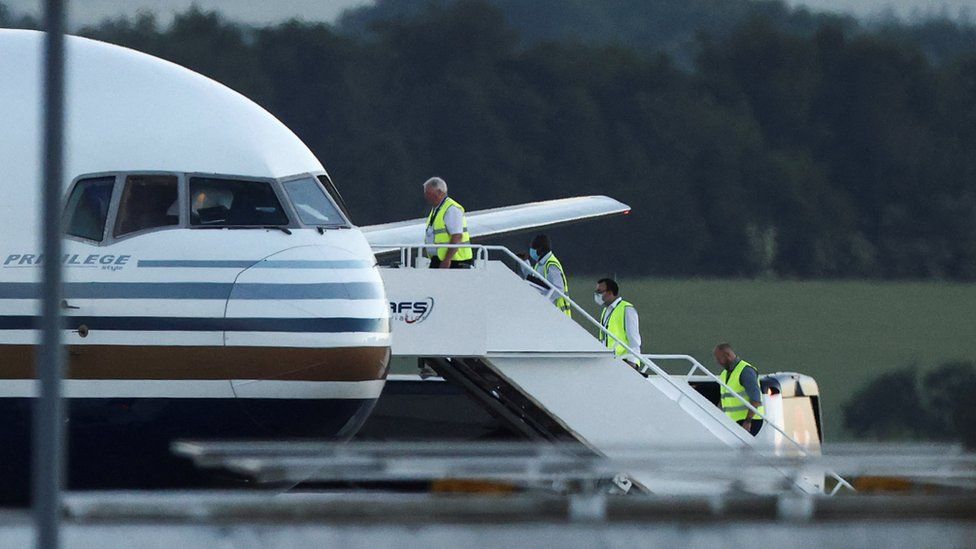ARTICLE AD BOX
 Image source, Reuters
Image source, Reuters
The first Rwanda flight was cancelled shortly before take-off in 2022 due to legal challenges
By Paul Seddon
Politics reporter
The home secretary has said deportations under the UK's agreement with Rwanda could be "quite low", depending on other factors.
James Cleverly told MPs the agreement with the east African nation was "only one part" of the government's response to illegal migration.
Returns deals with other countries could also have a "very significant impact" on the number sent, he added.
However, he refused to predict how many deportations would take place.
He added that the agreement with Rwanda was uncapped - and an exact number was "entirely contingent on a whole set of other work".
Questions over the cost of the scheme have grown louder after it emerged last month the UK has paid £240m to Rwanda so far, despite legal wrangles meaning no one has yet been sent there.
Under the five-year plan, the UK would send an unspecified number of asylum seekers to Rwanda - where they can apply to become a refugee there, or seek asylum in another "safe third country".
Legislation to revive the scheme after it was ruled unlawful by the Supreme Court was passed by MPs earlier this month, but is expected to run into considerable opposition in the House of Lords.
Despite the opposition to the plan, ministers are aiming to get the first flights off by the spring and hope it will then deter people from crossing the Channel in small boats.
At a session of the Home Affairs Committee, a top Home Official official said 33,085 asylum seekers had entered the system since new legal obligations to remove illegal arrivals, subject to certain conditions, came into force last July.
'Send a signal'
Asked how many of these could be sent to Rwanda, Mr Cleverly told the MPs the number of people sent could be "nearly at" that figure, but it was "entirely contingent" on the circumstances.
It was "entirely feasible a significant number within that cohort will be returned to their country of origin," he argued, whilst deals with other countries could also "have a very significant impact".
"It may well be if we're successful with returns agreements, if circumstances in other countries change, it may well be that the figure could be quite low," he added.
Under repeated questioning, he refused to put a figure on the number of deportations required to create a deterrent effect - but conceded they would need to "visibly send a signal" to potential migrants.
Home Office officials have declined to sign off the scheme as value for money, arguing the extent to which it will deter migrants is impossible to calculate until flights to Rwanda actually begin.
'Gimmick'
Ministers say once up and running, the scheme will save taxpayers money by reducing the amount the government spends on housing migrants in UK hotels, currently £8m a day.
However, the department has struggled to return large numbers of the small boat migrants coming to the UK in recent years.
Last month it emerged that only 1,040 small boat arrivals who weren't foreign convicted criminals have been returned to their country, or another country, in the last three years.
Of these, only 408 were not nationals of Albania, with which the government struck a co-operation deal to speed up returns in late 2022.
As an EU member, the UK could return hundreds of migrants a year under the so-called Dublin regulations - but the EU has refused to replicate this as part of a new agreement.
Labour has described the Rwanda policy as a "gimmick" and vowed to scrap it if it wins power at the general election later this year.
It also says it would negotiate a new deal with the EU to return migrants there.
The party has suggested that in exchange it may be willing to accept a quota of migrants in the UK, but has not specified what this would be.

 1 year ago
88
1 year ago
88








 English (US) ·
English (US) ·